关于有礼貌的作文100字
小学生文明礼仪的作文100字(精选22篇)

小学生文明礼仪的作文100字(精选22篇)小学生文明礼仪的作文100字(精选22篇)无论在学习、工作或是生活中,大家都经常看到作文的身影吧,作文根据写作时限的不同可以分为限时作文和非限时作文。
相信写作文是一个让许多人都头痛的问题,下面是小编精心整理的小学生文明礼仪的作文100字(精选22篇),仅供参考,大家一起来看看吧。
小学生文明礼仪的作文100字篇1我每天回家都要给爸爸妈妈表演我们一小的礼仪操。
我做的可标准了,而且礼仪操背的也很熟。
每次我们集体训练的时候我都是只做一遍就可以休息了。
因为我做的好,罗老师还给我奖励了巧克力呢。
我一定会继续加油,做的更好!小学生文明礼仪的作文100字篇2周一,又是一个阳光明媚的早晨,我背着书包去上学,一进学校我就和老师们问好,老师常常对我微笑,放学我就和老师说再见。
回到家里,家里来了很多客人,我就和他们问好,他们夸我很懂礼貌,我就学习去了。
这一点,我有时做不好,有时作业留得太多,有可能就忘记和他们问好。
我想在这次学校争戴微笑圈的活动中,改掉这个小毛病,早日成为一个讲文明懂礼貌的好孩子。
小学生文明礼仪的作文100字篇3今天,我们看了一段文明礼仪的视频,我看见了那个学校的坐姿、站姿和蹲姿和我们学校完全不同。
我还知道了看见老师要敬队礼表示问好,男生和女生握手的时候不要上下摇晃等等。
看完的时候,我觉的我以前没有做好,以后我一定改正。
小学生文明礼仪的作文100字篇4今天下午,我们在教室观看了一段视频,名字叫《文明礼仪好习惯》,视频中的同学个个精神抖擞,每个动作做得很标准,大家看的目瞪口呆,给我留下最深刻的印象是每件细小的事情,他们都展示出自己的好习惯。
看完这段视频后,我要向他们学习良好的习惯,改掉自己不好的坏习惯。
小学生文明礼仪的作文100字篇5星期五下午班会课的'时候,曹老师说班会课的主题是文明礼仪,老师先让我们看了一段关于文明礼仪的视频,然后曹老师带领我们一小部分礼仪。
礼貌的优秀作文

礼貌的优秀作文•相关推荐礼貌的优秀作文(精选34篇)在现实生活或工作学习中,说到作文,大家肯定都不陌生吧,根据写作命题的特点,作文可以分为命题作文和非命题作文。
那要怎么写好作文呢?以下是小编为大家整理的礼貌的优秀作文,希望对大家有所帮助。
礼貌的优秀作文篇1中国曾有“君子不失色于人,不失口于人”的古训,意思是说,有道德的人待人应该彬彬有礼,不能态度粗暴,也不能出言不逊。
礼貌待人,使用礼貌语言,是我们中华民族的优良传统。
《说岳全传》上有这么一段:牛皋向一位老者问路。
他在马上吼道:“呔,老头儿!爷问你,小校场往哪去?”老人不但没给他指路,反而生气地骂他是个“冒失鬼”。
过了一会儿,岳飞也来到这里。
他先离镫下马,然后上前施礼:“请问老丈,方才可曾见一个骑黑马的?他往哪条路上去了?”老人见岳飞很有礼貌,便耐心地给他指路,这正如俗话所说:“礼到人心暖,无礼讨人嫌”。
有一天,一个女青年下公共汽车,她的长裙拖在车厢的踏板上,被一个跟在后面的小学生踩了一下。
女青年回过头来看了看,小朋友连忙抬起脚说:“对不起,把您的裙子踩脏了。
”女青年微笑着说:“没关系。
”于是一场可能发生的纠纷避免了。
礼貌待人可以在人与人之间架起一座理解的桥梁,减少相互间的矛盾。
朱师傅为周总理理发20多年。
有一次刮脸时,周总理咳嗽了一声,脸上被划了一道小口子,朱师傅深感不安。
周总理安慰他说:“这不能怪您,怪我咳嗽没有向您打招呼,还幸亏您刀子躲得快哩!”朱师傅听了总理的话深受感动。
可见文雅,和气、宽容的语言,不但沟通了人们的心灵,而且反映出一个人的思想情操和文化修养。
人在社会上生活总要和别人交往。
学会礼貌待人,恰当地使用礼貌语言,就能使人与人之间的关系更加和谐,社会生活更加美好。
礼貌的优秀作文篇2那天晚上的梦真美呀!我躺在床上睡觉,睡着睡着我就做了那个梦,我梦见一个身穿彩霞一样的衣裳,有着一双透明的翅膀的小天使,正在我的梦里玩游戏呢。
这时,我觉得我的后背怪怪的,我马上回头看了一看,哇!我发现我也长了一双翅膀!我的翅膀竟然是粉红色的。
礼貌的重要性初中作文500字5篇
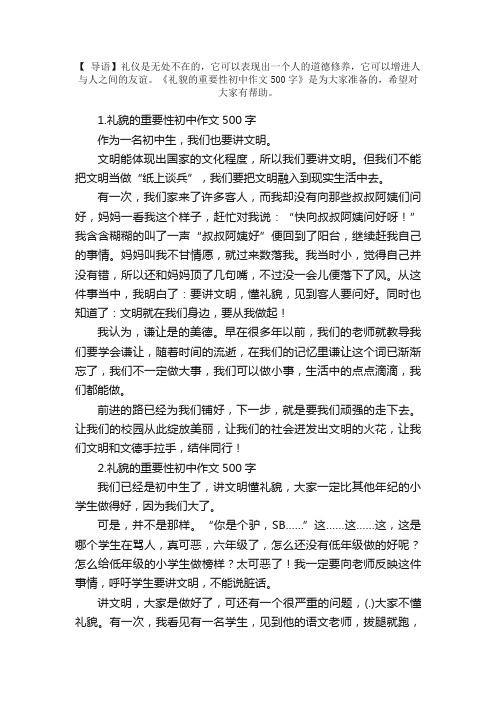
【导语】礼仪是无处不在的,它可以表现出一个人的道德修养,它可以增进人与人之间的友谊。
《礼貌的重要性初中作文500字》是为大家准备的,希望对大家有帮助。
1.礼貌的重要性初中作文500字作为一名初中生,我们也要讲文明。
文明能体现出国家的文化程度,所以我们要讲文明。
但我们不能把文明当做“纸上谈兵”,我们要把文明融入到现实生活中去。
有一次,我们家来了许多客人,而我却没有向那些叔叔阿姨们问好,妈妈一看我这个样子,赶忙对我说:“快向叔叔阿姨问好呀!”我含含糊糊的叫了一声“叔叔阿姨好”便回到了阳台,继续赶我自己的事情。
妈妈叫我不甘情愿,就过来数落我。
我当时小,觉得自己并没有错,所以还和妈妈顶了几句嘴,不过没一会儿便落下了风。
从这件事当中,我明白了:要讲文明,懂礼貌,见到客人要问好。
同时也知道了:文明就在我们身边,要从我做起!我认为,谦让是的美德。
早在很多年以前,我们的老师就教导我们要学会谦让,随着时间的流逝,在我们的记忆里谦让这个词已渐渐忘了,我们不一定做大事,我们可以做小事,生活中的点点滴滴,我们都能做。
前进的路已经为我们铺好,下一步,就是要我们顽强的走下去。
让我们的校园从此绽放美丽,让我们的社会迸发出文明的火花,让我们文明和文德手拉手,结伴同行!2.礼貌的重要性初中作文500字我们已经是初中生了,讲文明懂礼貌,大家一定比其他年纪的小学生做得好,因为我们大了。
可是,并不是那样。
“你是个驴,SB……”这……这……这,这是哪个学生在骂人,真可恶,六年级了,怎么还没有低年级做的好呢?怎么给低年级的小学生做榜样?太可恶了!我一定要向老师反映这件事情,呼吁学生要讲文明,不能说脏话。
讲文明,大家是做好了,可还有一个很严重的问题,(.)大家不懂礼貌。
有一次,我看见有一名学生,见到他的语文老师,拔腿就跑,根本不懂礼貌,对老师一点也不尊敬老师!见到老师应该主动上前说:“老师好!”而不是见到老师和见到魔鬼一样,尊敬老师是我们每一个同学应该做到的……在我们国家,就是因为我们不讲文明,随地吐痰,不讲卫生,就因为这样,我们才会被外国人瞧不起的,所以可见讲文明是多么重要的!大家口上都说,讲文明懂礼貌,可有谁做到了呢?从今天,一定要讲文明懂礼貌,给那些低年级的小同学做榜样,切记切记:一定要讲文明懂礼貌,让我们的祖国变得更强大,不再让外国人瞧不起咱中国!因为我们中国人很强大,加油,讲文明懂礼貌!3.礼貌的重要性初中作文500字我们生活在一个和平的国家,因为跟随着工商业时代的进步,就像每个人走路都愈走愈快,人在社会上的磨擦,就可能越来越大。
懂礼貌,不讲脏话的作文

懂礼貌,不讲脏话的作文
中国是礼貌古国,有“礼仪之邦”的美称。
礼貌待人是中华民族的传统美德,是我们国家、我们民族礼貌、进步的表现。
我们敬爱的周总理一向被人民称作礼貌待人的楷模。
有一次,周总理请一位姓朱的理发师给他刮脸刚刮了一半,周总理忽然咳嗽了一声,朱师傅没提防,刮了个小口子,朱师傅心里一阵紧张,忙说:咩我工作没做好,真对不起总理。
”周总理微笑着宽慰他说:“怎样能怪你呢!是我咳嗽没和你打招呼,还幸亏你刀躲的快。
”事后,总理还一再向朱师傅道谢,尽力消除朱师傅的顾虑。
我们小学生从小也就应讲礼貌,懂礼貌,语言和行为都要彬彬有礼,文雅而不粗野,要学会使用礼貌用语。
待人接物,行为举止,都要讲究礼貌礼貌,讲究仪表仪态,无论在校内校外,都要做到不打架,不骂人,不撒野。
要学会克制和谦让,自己不对,要勇于自我批评,别人不对,要能原谅别人的过失,当别人对自己表示歉意时,更不能得理不让人。
学校办公室是老师工作、学习和课余休息的地方,学生不能够随便进入。
如果有事必须要进,则应先敲门、报告,经老师同意后方可进入。
进入时,要轻手轻脚,避免发出声音,影响别人。
同学们,让我们继承和发扬中华民族讲礼貌的优良传统。
做到和气、文雅、谦逊,不讲粗话、脏话,不强词夺理,不恶语伤人,争做一个讲礼貌、懂礼貌的好孩子。
老师夸我真礼貌100字作文

<<老师夸我真礼貌>>今天上课,老师提了个问题,我举手回答,起身后先向老师鞠躬,回答完还说了谢谢。
下课后,老师摸着我的头说:“孩子,你真有礼貌。
”我心里可美啦,原来小小的礼貌举动能让老师这么开心,我决定以后要一直这么有礼貌。
作文二<<老师夸我真礼貌>>有一次在走廊上遇到老师,我主动停下脚步,微笑着向老师问好。
进老师办公室时,我先敲门,得到允许才进去。
老师把这一切都看在眼里,在班会上表扬我:“大家要向他学习,他真有礼貌。
”听到老师的夸奖,我暗暗发誓要做得更好。
作文三<<老师夸我真礼貌>>今天在学校,我看到老师抱着一摞作业本,赶忙跑过去帮忙。
进教室时,我轻轻敲门,还主动跟老师同学问好。
老师笑着说:“你真有礼貌!”我心里美滋滋的,以后我会一直做个有礼貌的好孩子。
作文四<<老师夸我真礼貌>>上课铃响了,我快步走进教室。
看到老师站在讲台上,我恭恭敬敬地鞠了一躬,大声说:“老师好!”下课的时候,我也不忘跟老师说:“老师再见!”老师摸着我的头夸我:“孩子,你真礼貌!”我特别开心,礼貌待人让我感觉很棒。
作文五<<老师夸我真礼貌>>今天,在学校里发生了一件让我特别开心的事。
老师上课时,我积极举手回答问题,回答完还不忘说声“谢谢老师”。
下课后,我见到老师主动问好。
老师笑着对我说:“你真礼貌,是同学们的好榜样!”听到老师的夸奖,我心里美滋滋的。
作文六<<老师夸我真礼貌>>有一次,我在走廊上不小心撞到了同学,赶忙说“对不起”。
到了教室,我帮老师搬作业本,双手递给老师。
老师看到后,当着全班同学的面夸我:“这位同学真有礼貌,大家都要向他学习。
”那一刻,我感到无比自豪。
作文七<<老师夸我真礼貌>>有一天,在学校里,我见到老师主动问好,帮老师拿东西。
进教室时,我轻轻开门关门,不打扰别人。
尊敬老人作文100字

尊敬老人作文100字【篇一:尊敬长辈】今天, 虽然外面凉爽, 但室内温度很高。
奶奶在厨房炒菜, 头上布满汗珠, 衣服都打湿了, 我看见了, 很心疼。
于是, 我赶紧拿了一把大扇子, 悄悄地走到奶奶身后, 用力扇起来, 奶奶顿时凉快了许多, 说:“睿琳真乖!”我说:“奶奶, 这是我应该做的, 以后我天天给您扇。
”我觉得任何事都要从小做起, 要尊敬长辈。
【篇二:尊敬老人】在一个阳光明媚的下午。
小红的爷爷搬着凳子坐在草坪旁边的空地上晒太阳。
突然小红跑过来问:“爷爷我来帮您捶捶背好吗?”爷爷说:“好呀, 你真是一个尊老爱幼的好孩子。
”小红笑了, 爷爷也笑了。
【篇三:尊敬老人】一个炎热的夏天, 大家都穿着短袖或无袖。
第二天, 小红在家里吃西瓜, 咚咚咚……门外响起敲门声, 小红连忙从厨房跑到门边, 开门一看, 原来是自己的奶奶。
小红连忙叫奶奶进来, 又到厨房去拿切好的西瓜, 递一片给奶奶吃。
奶奶接过西瓜, 亲切地对小红说:“你真是我的好孙女,会体贴奶奶。
”啊!小红真是个尊敬老人的好孩子呀!【篇四:做个孝敬长辈的好孩子】讲文明, 懂礼貌,孝敬关心和爱长辈,从小养成好习惯,是个人人夸的好苗苗!长辈来做客,要热情问好,要用笑脸接待,谦让座位, 敬茶敬烟。
孝敬长辈, 体贴长辈,中华民族的美德,给长辈带来幸福和欢乐,让我们行动吧!【篇五:孝敬老人扬美德作文100字】今天是九月初九也就是传统的重阳节。
重阳节也称老人节, 我们要从娃娃做起孝敬老人。
外婆是我们家里最辛苦的人, 每天买菜、做饭、洗衣还要接送我放学、上学, 真是太辛苦了!在这特殊的日子里, 我也要为外婆做点力所能及的小事。
于是, 我让外婆坐下给她捶捶背, 并对外婆说:“您辛苦了, 我一定会好好学习的, 您就放心吧!”【篇六:孝敬老人作文】中午吃饭时间到了, 小红, 小明, 妈妈还有奶奶一家围坐在桌子上准备吃饭, 饭桌上的饭菜很是丰富, 有鱼有肉还有虾, 还有汤。
文明礼仪小明星(自我介绍)100字
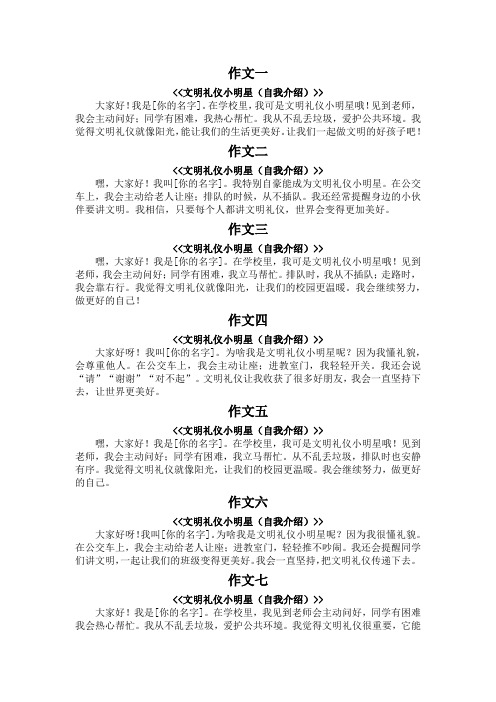
作文一<<文明礼仪小明星(自我介绍)>>大家好!我是[你的名字]。
在学校里,我可是文明礼仪小明星哦!见到老师,我会主动问好;同学有困难,我热心帮忙。
我从不乱丢垃圾,爱护公共环境。
我觉得文明礼仪就像阳光,能让我们的生活更美好。
让我们一起做文明的好孩子吧!作文二<<文明礼仪小明星(自我介绍)>>嘿,大家好!我叫[你的名字]。
我特别自豪能成为文明礼仪小明星。
在公交车上,我会主动给老人让座;排队的时候,从不插队。
我还经常提醒身边的小伙伴要讲文明。
我相信,只要每个人都讲文明礼仪,世界会变得更加美好。
作文三<<文明礼仪小明星(自我介绍)>>嘿,大家好!我是[你的名字]。
在学校里,我可是文明礼仪小明星哦!见到老师,我会主动问好;同学有困难,我立马帮忙。
排队时,我从不插队;走路时,我会靠右行。
我觉得文明礼仪就像阳光,让我们的校园更温暖。
我会继续努力,做更好的自己!作文四<<文明礼仪小明星(自我介绍)>>大家好呀!我叫[你的名字]。
为啥我是文明礼仪小明星呢?因为我懂礼貌,会尊重他人。
在公交车上,我会主动让座;进教室门,我轻轻开关。
我还会说“请”“谢谢”“对不起”。
文明礼仪让我收获了很多好朋友,我会一直坚持下去,让世界更美好。
作文五<<文明礼仪小明星(自我介绍)>>嘿,大家好!我是[你的名字]。
在学校里,我可是文明礼仪小明星哦!见到老师,我会主动问好;同学有困难,我立马帮忙。
从不乱丢垃圾,排队时也安静有序。
我觉得文明礼仪就像阳光,让我们的校园更温暖。
我会继续努力,做更好的自己。
作文六<<文明礼仪小明星(自我介绍)>>大家好呀!我叫[你的名字]。
为啥我是文明礼仪小明星呢?因为我很懂礼貌。
在公交车上,我会主动给老人让座;进教室门,轻轻推不吵闹。
我还会提醒同学们讲文明,一起让我们的班级变得更美好。
关于礼貌的作文英语100字初中
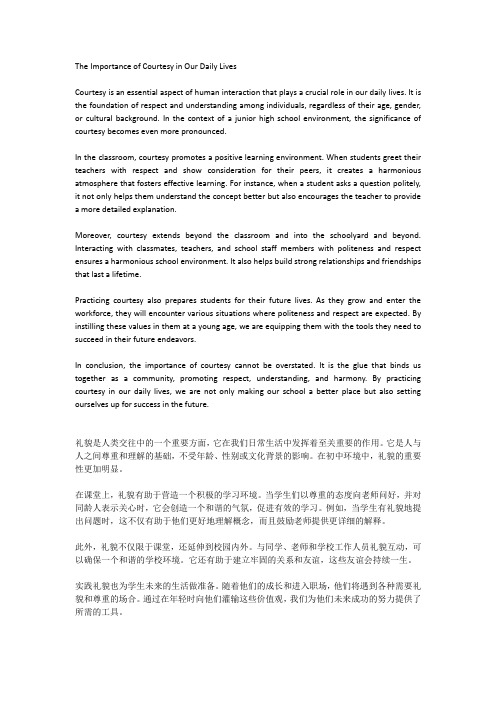
The Importance of Courtesy in Our Daily LivesCourtesy is an essential aspect of human interaction that plays a crucial role in our daily lives. It is the foundation of respect and understanding among individuals, regardless of their age, gender, or cultural background. In the context of a junior high school environment, the significance of courtesy becomes even more pronounced.In the classroom, courtesy promotes a positive learning environment. When students greet their teachers with respect and show consideration for their peers, it creates a harmonious atmosphere that fosters effective learning. For instance, when a student asks a question politely, it not only helps them understand the concept better but also encourages the teacher to provide a more detailed explanation.Moreover, courtesy extends beyond the classroom and into the schoolyard and beyond. Interacting with classmates, teachers, and school staff members with politeness and respect ensures a harmonious school environment. It also helps build strong relationships and friendships that last a lifetime.Practicing courtesy also prepares students for their future lives. As they grow and enter the workforce, they will encounter various situations where politeness and respect are expected. By instilling these values in them at a young age, we are equipping them with the tools they need to succeed in their future endeavors.In conclusion, the importance of courtesy cannot be overstated. It is the glue that binds us together as a community, promoting respect, understanding, and harmony. By practicing courtesy in our daily lives, we are not only making our school a better place but also setting ourselves up for success in the future.礼貌是人类交往中的一个重要方面,它在我们日常生活中发挥着至关重要的作用。
文明礼仪小明星光盘行动100字作文

文明礼仪小明星光盘行动100字作文文明礼仪是社会公德,我们要自觉遵守。
Civility is a social virtue, and we should consciously abide by it.在日常生活中,我们要注意言行举止。
In daily life, we should pay attention to our words and deeds.尊重他人是最基本的礼仪。
Respecting others is the most basic courtesy.不打扰别人休息是文明礼仪的表现。
Not disturbing others' rest is a manifestation of civility.排队等候是文明行为。
Queuing is a civilized behavior.不随地乱扔垃圾是文明礼仪。
Not littering everywhere is a civilized courtesy.保持公共场所清洁是每个人的责任。
Keeping public places clean is everyone's responsibility.尊重长者是中华传统美德。
Respecting the elderly is a traditional virtue in China.向他人微笑是传递友善的方式。
Smiling at others is a way to convey kindness.礼让他人是培养公德心的一种表现。
Yielding to others is a manifestation of cultivatingcivic-mindedness.睡觉时不大声喧哗是基本礼仪。
Not making loud noises while sleeping is basic etiquette.借用别人的东西要爱惜。
Borrowing someone else's things should be taken care of.对待公共设施要爱护。
有礼貌的作文(5篇)

有礼貌的作文(5篇)有礼貌的作文100字 1今天天气真好,小松鼠领着小动物们乘坐动物列车去郊游。
小动物们刚刚坐好,这时,山羊奶奶拄着拐杖上车了,可是车上已经没有空座位了。
山羊奶奶来到小猫雪儿的身旁,笑着说:“雪儿,给奶奶让个位置,好吗?”雪儿摇摇头,它不愿意给奶奶让坐。
小花狗诗玛看见了,它请山羊奶奶坐在了自己的'位置上,而它自己却蹲在了车厢里。
雪儿看见了,心里非常难过,它请诗玛同自己一起坐。
它们在车上有说有笑,开心极了!有礼貌的作文100字 2大家都知道,我们__是一个历史悠久、文化灿烂、举世闻名的.礼仪之邦。
__民族有着许许多多传统和美德。
讲礼貌、讲文明是我们做人的根本。
你对别人有礼貌,别人对你就有礼貌,某日在公共汽车上演了一幕:一个小青年出现了,在他面前有一个老爷爷正在上车,可那个小青年说:“老头,给你爷让道!”那个爷爷生气了,骂了他一句冒失鬼直接掉头走了。
有礼貌的作文100字 3一天,小明来到活动室,想打乒乓球,可是小明不认识他们,小明想:我应该有礼貌地对他们说。
于是,小明对小妹妹说:“小妹妹,我可以和你们一起打乒乓吗?”小妹妹说:“欢迎加入我们。
”小妹妹把乒乓球、乒乓板给小明。
他们玩得很可高兴啦!有礼貌的作文100字 4有一次,我和妈妈__公交车,人越来越多。
到了下一站,有一个老爷爷__公交车,我一看,发现位子都坐满了,就二话不说的叫老爷爷到我这个位子来坐,妈妈看了我一下,微笑地点了点头,说我有礼貌。
还有一次,家里来了很多客人来吃饭,我都不认识,妈妈跟我说这个是叔叔,这个是阿姨,他们回去的时候我还说:“叔叔、阿姨,下次有空再到我家里来吃饭。
”妈妈再次夸我有礼貌。
讲礼貌是最基本的`道理,我们应该做一个懂礼貌的好孩子。
有礼貌的作文100字 5今天放学的时候,我和妈妈看到了一颗大树,大树的`树干上怎么有一些皱皱巴巴的字呢。
我用手摸了摸,啊!原来是树的身上被划了一些字。
我想是谁怎么不讲文明呀?在树上乱花乱写。
礼仪心得100字左右作文(优秀8篇)
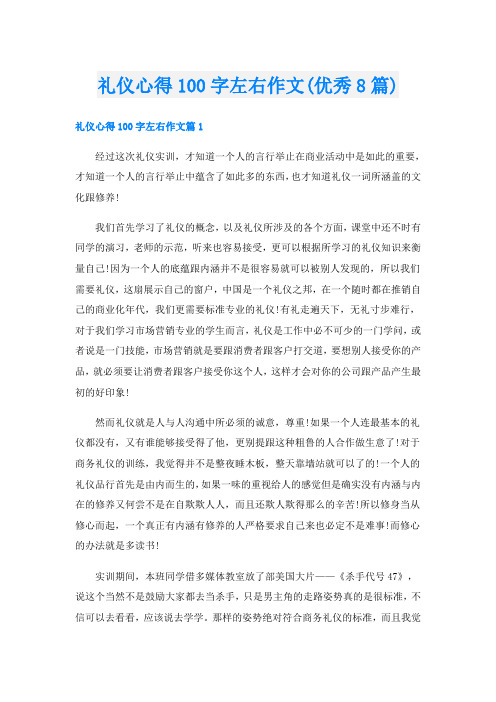
礼仪心得100字左右作文(优秀8篇)礼仪心得100字左右作文篇1经过这次礼仪实训,才知道一个人的言行举止在商业活动中是如此的重要,才知道一个人的言行举止中蕴含了如此多的东西,也才知道礼仪一词所涵盖的文化跟修养!我们首先学习了礼仪的概念,以及礼仪所涉及的各个方面,课堂中还不时有同学的演习,老师的示范,听来也容易接受,更可以根据所学习的礼仪知识来衡量自己!因为一个人的底蕴跟内涵并不是很容易就可以被别人发现的,所以我们需要礼仪,这扇展示自己的窗户,中国是一个礼仪之邦,在一个随时都在推销自己的商业化年代,我们更需要标准专业的礼仪!有礼走遍天下,无礼寸步难行,对于我们学习市场营销专业的学生而言,礼仪是工作中必不可少的一门学问,或者说是一门技能,市场营销就是要跟消费者跟客户打交道,要想别人接受你的产品,就必须要让消费者跟客户接受你这个人,这样才会对你的公司跟产品产生最初的好印象!然而礼仪就是人与人沟通中所必须的诚意,尊重!如果一个人连最基本的礼仪都没有,又有谁能够接受得了他,更别提跟这种粗鲁的人合作做生意了!对于商务礼仪的训练,我觉得并不是整夜睡木板,整天靠墙站就可以了的!一个人的礼仪品行首先是由内而生的,如果一味的重视给人的感觉但是确实没有内涵与内在的修养又何尝不是在自欺欺人人,而且还欺人欺得那么的辛苦!所以修身当从修心而起,一个真正有内涵有修养的人严格要求自己来也必定不是难事!而修心的办法就是多读书!实训期间,本班同学借多媒体教室放了部美国大片——《杀手代号47》,说这个当然不是鼓励大家都去当杀手,只是男主角的走路姿势真的是很标准,不信可以去看看,应该说去学学。
那样的姿势绝对符合商务礼仪的标准,而且我觉得电影里的东西更加容易模仿,因为毕竟那也是一种文化!这是我第一次参加实训,也不知道实训总结该怎么写,就随便说了些自己的感受与看法!而且在以后的日子里,我会按照商务礼仪中的准则去要求自己!礼仪心得100字左右作文篇26月14日参加了总行组织的服务礼仪培训,使我有幸聆听了专业资深专家具有国际标准水准的讲座,接受指导,她们在服务礼仪课程中所陈述的内容,使我深有感触。
礼貌作文100字

礼貌作文100字作为一种传承千年的文化,礼貌对于我们每个人来说都是非常重要的。
礼貌可以增进人际关系,提高我们的形象和素质,更能够让生活更美满。
今天我们不妨来探讨一下礼貌作文100字的重要性,以及如何在日常生活中运用礼貌。
首先,礼貌作文100字是一种表现我们修养和素质的方式。
写一篇礼貌作文并不需要有多么高深的文字功底,但就像每一个人都需要保持良好的个人形象一样,我们也需要在写作中展现出我们的礼貌。
举个例子,当我们在写作中用词恰到好处、不偏不倚,语言文雅、简单易懂,会给人留下修养好、素质高的印象,增加我们在他人心中的好感度。
其次,礼貌作文100字让我们更容易获得赞赏和肯定。
人与人之间是相互交流和沟通的,而在良好的交流和沟通中,如果我们能善用礼貌语言,无论是写作,还是口语,都会使人更加欣赏和认可。
此外,写出一篇礼貌的文章也会受到更多人的关注,获得更多的点赞和转发。
再次,礼貌作文100字是增强我们社交能力的方式。
在日常生活中,我们经常需要与人交往,无论是朋友、同事、上级还是下属等等,如果我们在写作中善用礼貌语言,就能更好地表达自己的观点,并吸引更多的人与自己更深入地沟通和交流。
通过这种方式,我们能够建立更多的人脉和联系,为自己的事业和生活打造更广阔的平台和机会。
最后,如何在日常生活中运用礼貌。
很简单,只需要时刻保持良好的言行举止,给人以良好的印象,并在写作中善用礼貌语言,就能带来意想不到的好效果。
同时,我们也要时刻将自己放在他人的角度考虑问题,并尊重他人的权利和尊严。
在与他人交往时,大可不必太过认真和在意,尽量让自己保持温和、谦虚、有礼貌的态度就好。
综上所述,礼貌作文100字在日常生活中的重要性不可忽视。
善用礼貌语言不仅可以展现我们的修养和素质,同时也能让我们获得更多人的赞赏和肯定,增强我们的社交能力。
因此,我们应该时刻注重细节,在日常生活中不断提升自己的礼貌素质,让我们的生活更加美好和丰富多彩。
关于礼貌的作文英语100字初中
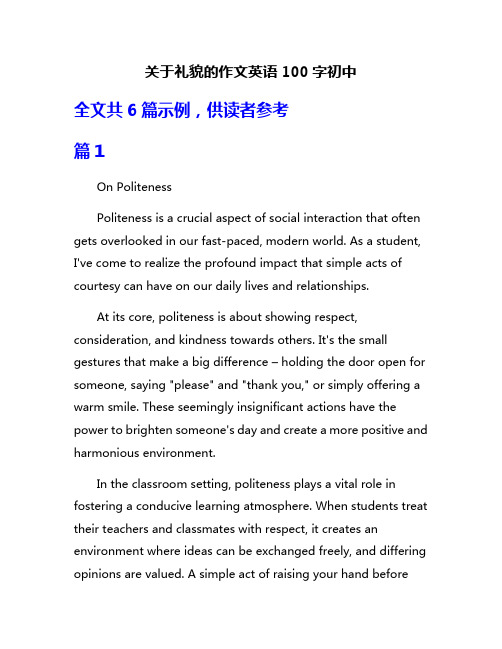
关于礼貌的作文英语100字初中全文共6篇示例,供读者参考篇1On PolitenessPoliteness is a crucial aspect of social interaction that often gets overlooked in our fast-paced, modern world. As a student, I've come to realize the profound impact that simple acts of courtesy can have on our daily lives and relationships.At its core, politeness is about showing respect, consideration, and kindness towards others. It's the small gestures that make a big difference – holding the door open for someone, saying "please" and "thank you," or simply offering a warm smile. These seemingly insignificant actions have the power to brighten someone's day and create a more positive and harmonious environment.In the classroom setting, politeness plays a vital role in fostering a conducive learning atmosphere. When students treat their teachers and classmates with respect, it creates an environment where ideas can be exchanged freely, and differing opinions are valued. A simple act of raising your hand beforespeaking or actively listening when others are talking can go a long way in promoting a collaborative and inclusive learning experience.Beyond the academic realm, politeness is equally important in our personal and professional lives. In our friendships and family relationships, practicing courtesy and empathy can strengthen bonds and prevent misunderstandings. In the workplace, displaying professionalism and treating colleagues with respect can contribute to a positive and productive work culture.However, politeness is not merely about following a set of rigid rules or societal norms. It's about genuinely caring for others and being mindful of their feelings and perspectives. True politeness stems from a place of kindness, compassion, and emotional intelligence.One of the most significant benefits of being polite is the positive impact it has on our own well-being. When we treat others with respect and consideration, we cultivate a sense of self-worth and confidence. It's a testament to our character and values, and it helps us build meaningful connections with those around us.In today's world, where technology has made communication more impersonal and instantaneous, it's crucial to remember the importance of politeness. A simple "thank you" text or a thoughtful email can go a long way in maintaining healthy relationships and fostering a more inclusive and respectful society.As students, we have the opportunity to learn and practice politeness from an early age. By embodying these values, we not only create a more positive learning environment but also develop essential skills that will serve us well in our future personal and professional endeavors.In conclusion, politeness is a powerful force that has the ability to transform our interactions and relationships. It's a reflection of our character and a testament to our commitment to creating a more compassionate and respectful world. Let us strive to make politeness a way of life, not just a superficial gesture, and watch as it ripples out, touching the lives of those around us in profound and meaningful ways.篇2On PolitenessBeing polite is something we're taught from a very young age. Our parents, teachers, and other authority figures emphasize the importance of saying "please," "thank you," and other polite phrases. But as I've grown older, I've come to realize that politeness encompasses so much more than just using the right words. True politeness is a way of life – a mindset and approach to interacting with others that demonstrates respect, consideration, and emotional intelligence.One of the most critical aspects of politeness is being mindful of others' feelings. It's easy to get wrapped up in our own thoughts, worries, and preoccupations, but a truly polite person makes an effort to consider how their words and actions might impact those around them. Something as simple as holding the door open for someone or offering to help carry their heavy load can make a significant difference in brightening someone's day.Active listening is another key component of politeness. Too often, we're guilty of only half-listening while someone is speaking, formulating our response in our heads instead of truly absorbing what they're saying. Polite individuals give their full attention, make eye contact, and ask follow-up questions toensure they've understood correctly. This simple act of engaged listening makes the other person feel valued and respected.Politeness also involves being respectful of others' boundaries, beliefs, and cultures. We live in an increasingly diverse world, and it's essential to approach different perspectives with an open mind and a willingness to learn. Rather than making assumptions or passing judgments, a polite person seeks to understand and appreciate the unique experiences and backgrounds of those around them.In today's fast-paced, often impersonal world, acts of politeness can be powerful reminders of our shared humanity. A simple "thank you" or a genuine smile can brighten someone's day and create a ripple effect of kindness and positivity. As I continue to navigate the challenges of growing up, I strive to cultivate a mindset of politeness – not just because it's the "right" thing to do, but because it has the power to make the world a little bit kinder, one interaction at a time.篇3On PolitenessPoliteness is one of those things that can sometimes seem like a burden, but is actually incredibly important in life. As amiddle school student, I've learned that being polite can make a huge difference in how my day goes and how I'm perceived by others.To start with, politeness is really just having good manners and being considerate of the people around you. It means saying "please" and "thank you," holding the door for someone, not interrupting when others are speaking, and just generally being respectful and mindful of others' feelings. It seems like such a simple thing, but you'd be surprised how many people lack basic politeness.In my experience, polite people simply get treated better than impolite ones. My teachers always seem to have a bit more patience with the polite students who say "excuse me" when they need something. The impolite ones who blurt things out or are rude often get called out for their rudeness. Same goes for when I'm at a restaurant or store - the polite customers seem to get better service because employees appreciate not being treated like dirt.Beyond just being treated better by others, practicing politeness has helped me become a better person overall. It forces me to be more aware of the people around me and how my actions affect them. It makes me slow down and think beforeI speak instead of just blurting things out thoughtlessly. Politeness requires empathy, consideration, and self-control, which are all positive qualities to develop.As I've gotten older, I've also realized how important politeness is for getting ahead professionally and in life. Polite people make better impressions at job interviews because they come across as respectful and good natured. Polite employees tend to get promoted more because managers appreciate their emotional intelligence and ability to work well with others. Even for things like college admissions, admissions officers take notice when applicants handle themselves politely during visits and interviews.That's why I always strive to be unfailingly polite, holding doors, saying please and thank you, not interrupting others, and showing consideration in every interaction. Sure, sometimes it can be annoying to have to censor myself and be on my best behavior all the time. But the benefits - being respected, getting better treatment, developing empathy and self-control - massively outweigh the minimal effort of basic politeness.In our fast-paced, often self-absorbed world, a little politeness can go a very long way. It's the type of simple habit that pays dividends throughout life. By practicing it consistentlyfrom a young age, hopefully it becomes ingrained as just part of who I am. Because polite, courteous people will always have an edge over the rude and inconsiderate. A little respect and human decency should be the bare minimum, not the exception.篇4Politeness: A Cornerstone of Civilized SocietyAs a student navigating the world, I have come to realize the profound importance of politeness in our daily interactions. Politeness is not merely a set of empty gestures or forced pleasantries; rather, it is a fundamental pillar upon which our harmonious coexistence rests. In a society where we are constantly bombarded with negativity and rudeness, the practice of politeness serves as a beacon of hope, reminding us of our shared humanity and our inherent capacity for kindness.From an early age, we are taught the basic tenets of politeness: saying "please" and "thank you," holding the door open for others, and using respectful language. However, as we grow older, we come to understand that politeness transcends these simple acts. It is a mindset, a way of being that permeates every aspect of our lives, shaping our interactions with family, friends, strangers, and even our own selves.In our personal relationships, politeness fosters an atmosphere of mutual respect and understanding. It is the oil that lubricates the gears of communication, allowing us to express ourselves without causing unnecessary offense or hurt. By being mindful of our words and actions, we create a safe space for open dialogue, where differing opinions can be shared without fear of judgment or belittlement.In the classroom, politeness is a catalyst for learning. When students treat one another and their teachers with courtesy and respect, an environment conducive to intellectual growth is cultivated. Raising hands before speaking, listening attentively, and refraining from disruptive behavior not only facilitate the smooth flow of lessons but also demonstrate a fundamental respect for the educational process and the collective pursuit of knowledge.Beyond the confines of our personal and academic spheres, politeness extends into the realm of public life. Simple acts, such as holding the door for a stranger or offering a kind word of encouragement to a passerby, can have a ripple effect, spreading positivity and goodwill throughout our communities. In a world often marked by indifference and self-absorption, these smallgestures serve as reminders of our shared humanity and our capacity for compassion.Moreover, politeness is not merely a one-way street; it is a reciprocal exchange that breeds more of itself. When we encounter politeness, we are more likely to mirror that behavior, creating a virtuous cycle of kindness and consideration. In this way, politeness becomes a contagious force, spreading from person to person, elevating the collective consciousness of our society.Furthermore, the practice of politeness is not limited to our interactions with others; it extends to our relationship with ourselves. By cultivating self-respect and treating ourselves with kindness and compassion, we set the stage for a more positive and fulfilling life. When we speak to ourselves with gentle encouragement rather than harsh criticism, we foster a sense of self-worth that radiates outward, influencing our interactions with those around us.In a world that often prizes assertiveness and self-promotion, it is easy to overlook the quiet power of politeness. Yet, it is precisely this unassuming virtue that weaves the fabric of our society, creating a tapestry of mutual understanding, respect, and kindness. As students and global citizens, it is ourresponsibility to embrace and champion politeness, for in doing so, we not only elevate ourselves but also contribute to the betterment of our world.篇5Title: The Importance of Politeness in Our Daily LivesPoliteness is a virtue that often goes unnoticed and underappreciated in our modern society. It's a simple concept, yet its impact on our daily interactions is profound. As a student, I've come to realize that being polite not only makes our lives easier but also creates篇6Politeness: A Virtue Worth CultivatingPoliteness is often seen as a small gesture, a mere formality, or a quaint relic of a bygone era. However, I firmly believe that it is a virtue that deserves to be cherished and nurtured in our modern society. Politeness is not just about using the right words or following a set of arbitrary rules; it is a profound expression of respect, consideration, and empathy towards others.From a young age, we are taught the basic tenets of politeness: saying "please" and "thank you," holding the door open for others, and using respectful titles when addressing elders or authority figures. These simple acts may seem trivial, but they lay the foundation for a more harmonious and civilized society. By demonstrating politeness, we acknowledge the inherent worth and dignity of every individual, regardless of their social status, background, or personal circumstances.In our increasingly fast-paced and interconnected world, it is easy to become preoccupied with our own needs and desires, inadvertently neglecting the well-being and comfort of those around us. Politeness serves as a gentle reminder to pause, consider the perspectives of others, and treat them with the same respect and kindness that we ourselves would hope to receive.Moreover, politeness is not just a one-way street; it is a reciprocal exchange that fosters a sense of community and belonging. When we extend courtesies to others, we create an environment of mutual respect and understanding, where people feel valued and appreciated. This, in turn, encourages them to pay it forward, perpetuating a cycle of kindness andconsideration that has the potential to ripple through our society.In professional settings, politeness is not merely a matter of etiquette; it is a crucial component of effective communication and collaboration. By treating colleagues, clients, and stakeholders with respect and courtesy, we establish a foundation of trust and credibility that can facilitate productive working relationships and foster a positive organizational culture.Critics may argue that politeness is an outdated concept, a relic of a more formal and rigid era. However, I would counter that politeness is a timeless virtue that transcends cultural and generational divides. It is a universal language that speaks to our shared humanity and our innate desire for respect, kindness, and consideration.In a world that often seems consumed by conflict, division, and self-interest, politeness stands as a beacon of hope, reminding us of our capacity for compassion and our ability to build bridges instead of erecting walls. It is a small act with profound implications, a gentle reminder that we are all connected, and that our words and actions have the power to uplift or diminish those around us.As a student, I strive to embody the principles of politeness in my daily interactions, whether in the classroom, on the playground, or in the broader community. I recognize that my words and actions have the power to shape the perceptions and experiences of those around me, and I choose to wield that power responsibly and with kindness.In conclusion, politeness is not merely a set of outdated rules or empty gestures; it is a virtue that deserves to be celebrated, cultivated, and passed down to future generations. By embracing politeness in our daily lives, we create a more harmonious, respectful, and compassionate society, one small act of kindness at a time.。
以尊重为话题的作文100字
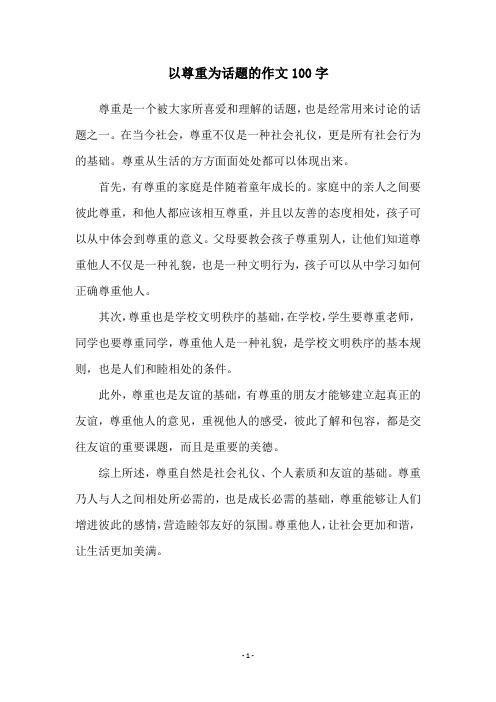
以尊重为话题的作文100字
尊重是一个被大家所喜爱和理解的话题,也是经常用来讨论的话题之一。
在当今社会,尊重不仅是一种社会礼仪,更是所有社会行为的基础。
尊重从生活的方方面面处处都可以体现出来。
首先,有尊重的家庭是伴随着童年成长的。
家庭中的亲人之间要彼此尊重,和他人都应该相互尊重,并且以友善的态度相处,孩子可以从中体会到尊重的意义。
父母要教会孩子尊重别人,让他们知道尊重他人不仅是一种礼貌,也是一种文明行为,孩子可以从中学习如何正确尊重他人。
其次,尊重也是学校文明秩序的基础,在学校,学生要尊重老师,同学也要尊重同学,尊重他人是一种礼貌,是学校文明秩序的基本规则,也是人们和睦相处的条件。
此外,尊重也是友谊的基础,有尊重的朋友才能够建立起真正的友谊,尊重他人的意见,重视他人的感受,彼此了解和包容,都是交往友谊的重要课题,而且是重要的美德。
综上所述,尊重自然是社会礼仪、个人素质和友谊的基础。
尊重乃人与人之间相处所必需的,也是成长必需的基础,尊重能够让人们增进彼此的感情,营造睦邻友好的氛围。
尊重他人,让社会更加和谐,让生活更加美满。
- 1 -。
谈礼貌作文100字_学生日记

谈礼貌作文100字_学生日记篇一:礼貌李昴熠今天我在妈妈单位的电梯里遇到了一位妈妈不认识的叔叔,当我和妈妈讨论问题的时侯,叔叔说:已经到一楼了,我说谢谢叔叔提醒我们。
我们下了电梯我就想起来给叔叔问好,我说叔叔好——再见,叔叔夸我说好有礼貌啊。
篇二:礼貌今天下午,我家里来了客人,其中有一个小朋友,我们在家里快乐的玩了一会儿她就走了,走之后还把我的好朋友胖胖带走了。
胖胖是一个胖胖的圣诞老人,是妈妈送给我心爱的礼物,我很不开心,因为她没有经过别人的允许就拿走东西,我觉得她很不礼貌,我们不要向她学习。
篇三:讲礼貌李宪哲妈妈常说:“讲礼貌不用花钱,可是能得到一切。
”你对别人讲礼貌,别人同样也会礼貌对你,还可以解决许多平时出现的小矛盾。
我应该对别人常说礼貌用语。
当爸爸妈妈下班回到家里,我礼貌地说:“爸爸妈妈辛苦啦!”爸爸妈妈都夸我长大了,这是多么幸福啊!当我想借同学的东西,我礼貌地说:“请把你的东西借我用一下,可以吗?”同学都会高兴地答应我,这是多么快乐啊!我对别人礼貌,别人就喜欢我。
礼貌给我带来许多快乐。
篇四:做有礼貌的孩子樊博飞睡觉前,我看了贝贝熊系列的《礼貌待人》,觉得这句话说的真好:多说“请”和“谢谢”,没礼貌的孩子也会变的彬彬有礼。
我体会到有了礼貌,一切都那么融洽,而且,一旦养成了讲礼貌的好习惯,我们连想也不用想,就会做得非常好!篇五:懂礼貌的孩子李昴熠今天下午,爸爸妈妈带我去卖衣服,进入商店,商店里的商品各种各样、五颜六色,摆放的特别整齐。
商店里的阿姨面带微笑,让每位顾客觉得心情很舒畅,我们一家东看看西望望,最后我挑选一件翠绿色的短裤,配上我自己一件白色发亮的格格短袖显得我更加帅气,爸爸妈妈很满意我自己挑选的颜色,买完衣服我高高兴兴的离开商店时,我对面带微笑阿姨说“再见”,阿姨夸我是个懂礼貌的孩子,爸爸妈妈走出商店后也夸我有礼貌、长大了,我心里乐滋滋的就像喝了蜜一样甜。
关于礼貌的作文100字_记事作文

关于礼貌的作文100字_记事作文
篇一:礼貌刘贻珂
今天,我在网上下棋,碰到一个韩国的,我邀请他下棋,他同意了,下完之后,虽然他输了,但是他说:“谢谢你让我度过快乐的时光”我们中国人才是有礼貌的人,对吗?
这篇文章虽然写的短,但是,希望看了这篇文章的人都能变得有礼貌。
篇二:懂礼貌[100字] 金上雅
星期天上午,方方出去玩,因为跑得太快了没看路面,不小心摔了一跤。
腿上摔破了一块皮,有点痛,方方坐在地上哇哇大哭。
小红看到后,跑过来把方方扶起来说道:“你没事吧?要不要紧呀?”方方站起来后,觉得腿上也不痛了,方方对小红说,“谢谢你!”
篇三:做一个有礼貌的小学生荣泽宇
我今天中午洗碗时,有一个别班的同学也在洗碗,他跟另外一个同学玩水,他不小心将水撒我在我的衣服上,我看他了一眼,他连声对不起都没有说就走了,真没有礼貌。
我不能向他学习,我要做一个有礼貌的小学生。
篇四:有礼貌
清晨,太阳露出了笑脸,小公鸡在山坡上叫鸣:“喔、喔、喔——”。
小公鸡一抬头,看到太阳,连忙打招呼:“太阳公公您早!”太阳公公笑眯眯地说:“小公鸡早!你真勤劳!”小公鸡谦虚地说:“我要把沉睡的人们唤醒,让他们开始工作!这是我的职责!”太阳公公和小公鸡都笑了。
篇五:懂礼貌罗元辰
今天,我在学校的二楼楼道,不小心把一个别班的小女孩给撞倒了,因为我和我们班同学在跑,就把她撞倒了,我赶紧把她扶起来,给她说:“对不起”,她赶紧起来,对我说:“谢谢你”,我觉得我和她都是懂礼貌的孩子。
我以后要经常做一些懂礼貌的事情,我要做一个懂礼貌的少先队员。
文明礼仪伴我行作文100字

文明礼仪伴我行作文100字礼仪教育是我们学习的开始,做好了文明礼貌我们才能做一个合格的小学生。
小编收集了文明礼仪伴我行作文100字,欢迎阅读。
第一篇:文明礼仪伴我行中国是古代的文明古国之一,中国人从小就养成文明礼貌的习惯。
生活中的点点滴滴,文明礼仪时时刻刻都伴随着我。
每当过马路的时候,我从来不闯红灯。
每当手中的垃圾在徘徊的时候,我从来不乱丢。
每当路旁花坛里的鲜花多么惹人爱的时候,我从来不乱摘。
每当朋友需要帮助的时候,我从来都是自告奋勇地伸出双手。
朋友们,让我们行动吧!文明礼仪是一种美德,让它永远传承下去!第二篇:文明礼仪伴我行文明礼仪人人记,对待别人要微笑,看见别人要问好,请、您好、谢谢、再见、对不起... …时常挂嘴边。
文明礼仪人人记,讲文明、树新风,尊老爱幼互谦让,爱花草、护树木,人人要遵守,文明世界我们共创造,少先队,升国旗,要讲文明话。
文明礼仪人人记,乘车出门要排队,主动让位给老弱病残。
文明礼仪人人记,遵纪守法要牢记,红灯停,绿灯行,我们要记清,和谐中国,和谐奥运,文明礼仪从你我做起。
第三篇:文明礼仪伴我行如何做一个讲文明的人?其实做一个讲文明的人很简单,从自我做起,从身边做起。
道德也许是一张纸的厚度,也许是一点耐心的等待,也许是一句善良的问候,更也许只是一个微笑。
一言一行总关情,在不经意间,我们传播着热情,尊重,关爱和友谊,这就是讲文明。
这点点滴滴的赞美和欣赏,如甘霖似雨露,滋润着我们的心田。
第四篇:文明礼仪伴我行礼仪教育是我们学习的开始,做好了文明礼貌我们才能做一个合格的小学生。
学校经常开展文明礼仪教育活动,每天放学集会,升国旗仪式时,班队会等。
都要对学生进行这方面的教育,让学生在学校见到师长和客人要敬礼问好,同学之间要相互尊重,不说脏话等。
在校园里还刊出文明礼仪板报宣传礼仪思想,使师生看在眼里,记在心中,付诸在行动中。
当你走在我们的校园里,你会看到是一片和谐相处的景象。
关于尊老爱幼的作文100字6篇

关于尊老爱幼的作文100字6篇
【作文一】
尊老爱幼是中华民族的传统美德,也是我们应该努力养成的好习惯。
大家都知道老人是我们的长辈,他们有着丰富的人生经验和深刻的思想。
我们应当尊重他们,照顾他们,照顾好他们的生活起居和身体健康。
幼小的孩子则是我们的希望和未来,我们应该关心他们的成长,关爱他们的身心健康,帮助他们解决困难。
我们应该做个善良而有良心的人,让尊老爱幼的美德在我们身上得到发扬光大。
写作重点:要点鲜明,讲述尊老爱幼作为一个好习惯的重要性,并举了例子进行说明。
用词简明易懂,情感真挚。
【作文二】
尊老爱幼是我们中华民族的传统美德,体现了我们国家的文化底蕴和人文精神。
尊老爱幼不仅仅是一种礼貌和责任,更是我们的人情味和爱心。
老人是我们的长辈,我们应该尊敬他们,关心他们的生活和身体健康。
幼小的孩子是我们的希望和未来,我们应该用心去关爱他们,鼓励他们尽情地成长。
如果我们都能够做到尊老爱幼,社会将会变得更加和谐和美好。
写作重点:强调了尊老爱幼是中华民族的传统美德,而且点明了尊老爱幼的意义和特征,语言简短但意味深远。
要点分析:
1. 尊老爱幼的重要性
2. 举例说明尊老爱幼意味
3. 题目要求学生口吻,语言可简短易懂
4. 需要注意情感真挚,保持语气轻松愉悦
5. 高分作文应该思路清晰,条理分明
用词分析:
1. “尊重”,“照顾”,“关心”,都符合尊老爱幼的精神内涵,用于作文表述恰当。
2. “善良”,“良心”,传达了一个积极向上的情感,
3. 用词简明易懂,清晰明了。
- 1、下载文档前请自行甄别文档内容的完整性,平台不提供额外的编辑、内容补充、找答案等附加服务。
- 2、"仅部分预览"的文档,不可在线预览部分如存在完整性等问题,可反馈申请退款(可完整预览的文档不适用该条件!)。
- 3、如文档侵犯您的权益,请联系客服反馈,我们会尽快为您处理(人工客服工作时间:9:00-18:30)。
篇一:有礼貌的小鸟[100字]谢单
假期,妞妞回农村爷爷家。
每天她都能听到山上小鸟的叫声,还有不认识的小朋友。
一天,妞妞问爷爷:爷爷,为什么每天小鸟叽叽喳喳叫个不停?爷爷笑着说:那是小鸟们在相互打招呼。
从那以后,妞妞见到村里的小朋友都主动打招呼。
爷爷问她:现在怎么变得会和人打招呼?妞妞说:因为我要做一个有礼貌的小鸟!
篇二:懂礼貌的小猪[100字]曲绍雯
昨天妈妈给我买了一本书叫《懂礼貌的小猪》,书里写到小猪很爱吃草。
篇三:有礼貌的小灰兔[100字]张睿轩
一天早上,小灰兔出门去看外婆,去外婆家的路上,小灰兔遇到了小山羊。
小山羊刚从菜地回来,她提着一个大篮子,里面装满了青菜。
小山羊累得满头大汗。
小灰兔过去帮助小山羊把菜抬回了小山羊家。
于是小灰兔继续赶路。
他走到一个小河边,河上边有个独木桥。
小灰兔刚走到桥中央,山羊伯伯过来了。
小灰兔看到了山羊伯伯说:山羊伯伯您先过。
山羊伯伯摸着小灰兔的头说:真是个有礼貌的好孩子!
篇四:懂礼貌的小猴
有一天,小白兔要去上学了,它要过一条河,河上有座独木桥。
小猴和它爸爸这天也要过河去摘桃子。
它们在河对岸上碰见了,小白兔对小猴说:我要赶着去上学,能让我先过独木桥吗?。
小猴说:不可以,我迫不及待地要过河摘桃子呢,这又大又甜的桃子去迟了,要被虫子吃光了。
小猴爸爸听见了,对小猴说:你看小兔子要去上学,让它先过河吧,不然要迟到的,。
小猴听了后,对小白兔说你先过吧。
小白兔高兴地对小猴说了谢谢,飞快地向学校跑去了。
小猴爸爸高兴地对小猴说:小猴真是一个懂礼貌的好孩子。
篇五:有礼貌的小白兔李周航
今天天气很好,小白兔要去上学校,有一条小河拦在前面,小白兔要过独木桥。
猴妈妈带着小猴子也要过独木桥去摘桃子,小白兔让猴妈妈和小猴先过桥,猴妈妈夸小白兔真有礼貌。
